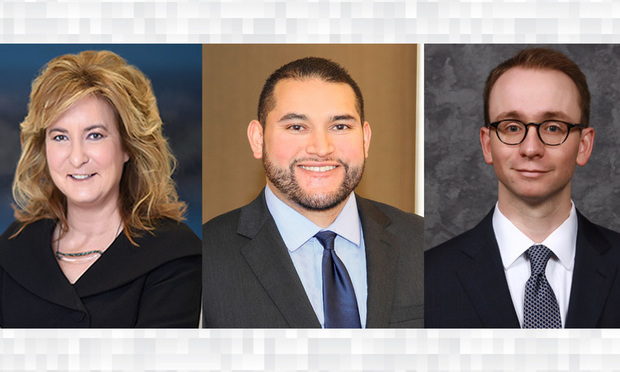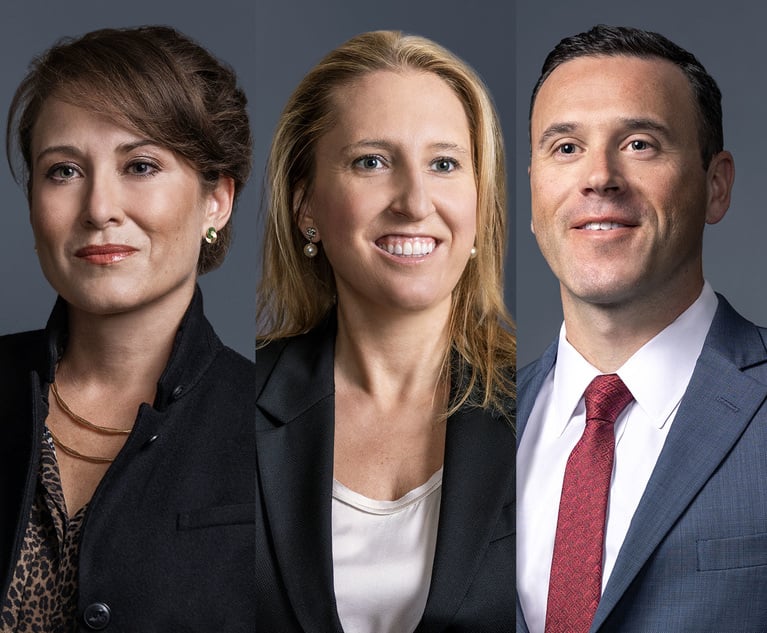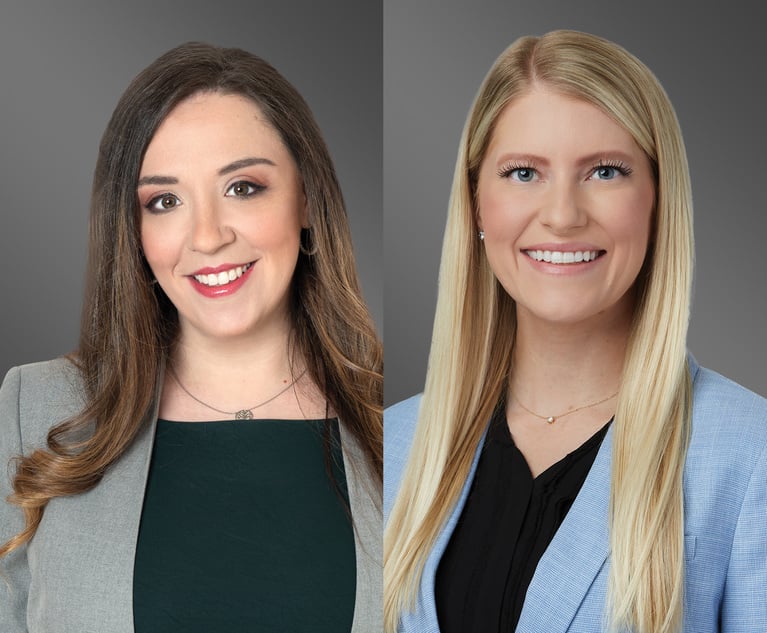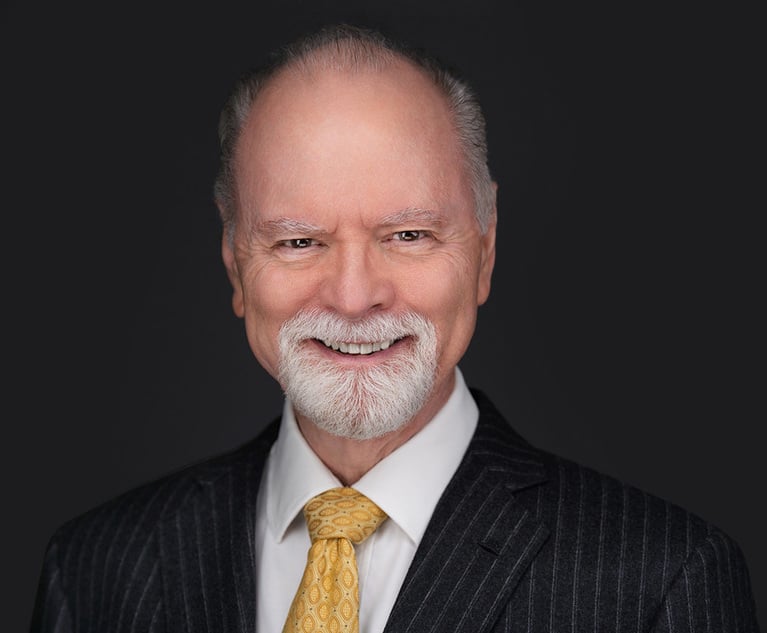Arbitration After 'Epic Systems v. Lewis': Implications for California Employers
The authors detail the impact of the high court's decision on FLSA claims and outline the decision's implications for the arbitrability of claims arising under California's Labor Code Private Attorneys General Act.
May 30, 2018 at 05:24 PM
11 minute read
 From left, Mary-Christine Sungaila, Marco A. Pulido and Alex Stevens, of Haynes and Boone.
From left, Mary-Christine Sungaila, Marco A. Pulido and Alex Stevens, of Haynes and Boone.
The U.S. Supreme Court's recent decision in Epic Systems v. Lewis, No. 16-285 (U.S. May 21, 2018), confirms that the Federal Arbitration Act (FAA) requires arbitration agreements to be enforced according to their terms, even individual arbitration agreements between an employer and an employee.
In this article, we detail the impact of the high court's decision on Fair Labor Standards Act (FLSA) claims. We also outline the decision's implications for the arbitrability of claims arising under California's Labor Code Private Attorneys General Act (PAGA).
• 'Epic' answers whether employers and employees can agree to individually arbitrate employment-related claims.
Epic concerned three consolidated FLSA cases involving employer-employee agreements requiring bilateral (i.e., individual) arbitration: Epic Systems, which arose from the U.S. Court of Appeals for the Seventh Circuit; Ernst & Young v. Morris, from the Ninth Circuit; and National Labor Relations Board v. Murphy Oil USA, from the Fifth Circuit. The trio of cases before the Supreme Court differed “in detail but not in substance.”
In Ernst & Young, the accounting firm and one of its junior accountants, Stephen Morris, entered into an arbitration agreement specifying individualized arbitration, with claims pertaining to different employees to be heard in separate proceedings. After his employment ended, Morris brought a class and collective action against Ernst & Young in federal court, alleging that the firm had misclassified its junior accountants as professional employees and violated the FLSA and California law by paying them salaries without overtime pay, according to the opinion. The district court granted Ernst & Young's motion to compel arbitration, but the Ninth Circuit reversed that decision.
In Lewis v. Epic Systems, 823 F.3d 1147, 1151 (7th Cir. 2016), Jacob Lewis (a technical writer) and Epic Systems (a health care software company) entered into an agreement requiring any wage-and-hour claims against the company to be brought only through individual arbitration. After a dispute with Epic Systems, Lewis sued in federal court, alleging that Epic Systems violated the FLSA and Wisconsin law by misclassifying Lewis and his fellow technical writers to avoid paying them overtime. Epic Systems moved to compel arbitration, the district court denied that request, and the Seventh Circuit affirmed.
In Murphy Oil, 808 F.3d 1013, 1015 (5th Cir. 2015), the National Labor Relations Board (NLRB) issued an order in which it concluded that Murphy Oil USA Inc. unlawfully obligated certain employees to sign an arbitration agreement waiving their right to pursue class and collective actions. Murphy Oil USA petitioned the Fifth Circuit for review of the NLRB's decision. The Fifth Circuit partially granted the company's petition, holding that the company did not commit unfair labor practices by requiring employees to sign its arbitration agreement, or by seeking to enforce the bilateral arbitration agreement in federal district court.
The U.S. Supreme Court reversed the judgment of the Ninth Circuit in Ernst & Young and the Seventh Circuit's in Epic, but affirmed the Fifth Circuit's judgment in Murphy Oil. The Epic court held that the FAA requires courts to enforce arbitration agreements between employers and employees according to their terms, even when the agreements provide only for arbitration through “individualized proceedings” rather than class procedures. In so holding, the court refused to read the National Labor Relations Act (NLRA) to prohibit arbitration agreements requiring individualized arbitration as an impermissible restriction on employees' rights under NLRA Section 7 to “engage in … concerted activities for the purpose of … mutual aid or protection,” 29 U.S.C. § 157, holding that Section 7 “focuses on the right to organize unions and bargain collectively” and “does not even hint at a wish to displace the [FAA].”
The court reasoned that the employees' theory ran “afoul of the usual rule that Congress does not alter the fundamental details of a regulatory scheme in vague terms or ancillary provisions—it does not, one might say, hide elephants in mouseholes” (internal quotations omitted). In particular, the court observed that it is “more than a little doubtful that Congress would have tucked into the mousehole of [NLRA] Section 7's catchall term an elephant that tramples the work done by these other laws; flattens the parties' contracted-for dispute resolution procedures; and seats the [NLRB] as supreme superintendent of claims arising under a statute it doesn't even administer.”
The immediate takeaway from Epic is clear: The FAA requires courts to enforce arbitration agreements with class action waivers according to their terms, even in the employment context. Accordingly, employers across the country now have more certainty that when they agree to bilateral arbitration, courts will enforce that agreement.
Still, other challenges to the enforceability of arbitration agreements lurk on the horizon. Despite the court's clear holding in Epic confirming that the NLRA lacked any evidence of congressional intent to displace the FAA's mandate, plaintiffs may still attempt to rely on an alleged tension between other federal statutes and the FAA's “saving clause,” which permits courts to refuse to enforce arbitration agreements “upon such grounds as exist at law or in equity for the revocation of any contract.” (“Put[ting] to the side the question whether [the FAA's] saving clause was designed to save … defenses allegedly arising from federal statutes.”) Post-Epic, one defendant in a pending Ninth Circuit appeal has filed a notice of supplemental authorities arguing that Epic's reasoning applies equally to other statutes beyond the NLRA, such as alleged breach of fiduciary duty claims under the Employee Retirement Income Security Act. (See Munro v. University of Southern California, Case No. 17-55550, Docket No. 49 (9th Cir. May 24, 2018).) Courts encountering such questions should follow the Epic court's analysis and reject any argument against arbitration that relies on a federal statute that does not contain a clear congressional command to override the FAA.
In addition to attempts to distinguish Epic, other challenges to arbitration may come from former-employee plaintiffs who have already signed general arbitration agreements without express class-action waivers. These plaintiffs may seize on general language in their arbitration agreements to argue that the parties intended to preserve class procedures in arbitration. The court is poised to resolve this question next term when it considers whether the FAA forecloses a state-law interpretation of an arbitration agreement that would authorize class arbitration based solely on general language commonly used in arbitration agreements. (See Varela v. Lamps Plus, 701 F. App'x 670 (9th Cir. 2017), cert. granted, No. 17-988 (U.S. Apr. 30, 2018).)
In Lamps Plus, a panel majority of the Ninth Circuit concluded that an arbitration agreement lacking an express class-action waiver was ambiguous, relied on state-law contract principles to interpret the agreement, and held that the ambiguity in the agreement permitted classwide arbitration. The dissenting judge concluded that the arbitration agreement was not ambiguous in the first place, and cited to U.S. Supreme Court precedent holding that a party may not be compelled under the FAA to submit to class arbitration unless there is a contractual basis for concluding that the party agreed to do so.
The court's opinion in Epic may suggest that the court's deference to the FAA will lead it to reject the use of general contract language in Lamps Plus to authorize class arbitration that strayed from the agreed-upon expectations of the contracting parties. In Epic, the Court described its foundational holding in AT&T Mobility LLC v. Concepcion, 563 U.S. 333 (2011), as yielding the “essential insight” that “courts may not allow a contract defense to reshape traditional individualized arbitration by mandating classwide arbitration procedures without the parties' consent.” Proponents of “traditionally individualized” arbitration will likely remind the court of this holding to argue that, like the NLRA, state-law principles of contract interpretation cannot mandate class arbitration procedures under the FAA without the parties' consent.
• 'Epic' sheds further light on the arbitrability of representative PAGA claims.
Some have questioned the impact of Epic in California, given the California Supreme Court's separate treatment of PAGA claims in Iskanian v. CLS Transportation Los Angeles LLC, 59 Cal. 4th 348 (2014). (See Marcia Coyle's “Plaintiffs Plot 'Way Around' Supreme Court's Ruling Against Worker Class Actions,” The National Law Journal (May 25, 2018); and Daniel Wiessner's ”SCOTUS ruling on waivers may boost 'private attorney general' proposals,” Reuters Legal (May 23, 2018).)
But Iskanian decided only that a contractual provision completely waiving representative PAGA claims was not enforceable—not whether PAGA claims can be arbitrated at all. The Iskanian court concluded that the FAA does not preempt its “rule against PAGA waivers” because “the FAA aims to ensure an efficient forum for the resolution of private disputes, whereas a PAGA action is a dispute between an employer and the state.”
The arbitrability of PAGA claims is a question that was “left open by the California Supreme Court's decision in Iskanian.” (See “The Arbitrability of Claims Arising Under PAGA” by Mary-Christine Sungaila & Marco Pulido, Law 360 (Mar. 16, 2018).) This question has since escaped a uniform answer from the state and federal appellate courts: The “Ninth Circuit, in several unpublished decisions, has held that parties may agree to arbitrate, but not completely waive the right to bring, a representative PAGA claim,” while at “least one unpublished Ninth Circuit decision and several from the California courts of appeal have taken a broader view of Iskanian, concluding that certain PAGA claims are not subject to arbitration.”
The California Supreme Court has agreed to hear two PAGA cases that could fill in some of the gaps from Iskanian: (1) Kim v. Reins International California, 18 Cal. App. 5th 1052 (Cal. Ct. App. 2017), review granted March 28, 2018, S246911; and (2) Lawson v. ZB N.A., 18 Cal. App. 5th 705 (Cal. Ct. App. 2017), review granted March 21, 2018, S246711. Kim concerns an issue of statutory interpretation: whether, under the PAGA statute, an employee is an “aggrieved employee” and has standing to pursue a representative PAGA claim after settling his individual claims against the employer.
In Lawson, the court has agreed to decide whether the FAA compels arbitration of a representative PAGA action seeking individualized lost wages as civil penalties under California Labor Code Section 558. On this question, Lawson expressly parted ways with another recent state appellate decision: Esparza v. KS Industries L.P., 13 Cal. App. 5th 1228, 1236 (Cal. Ct. App. 2017) (holding that an employee's recovery of unpaid wages under “Section 558 is, for purposes of the Federal Arbitration Act, a private dispute arising out of his employment contract with” an employer and therefore arbitrable).
Epic may limit how far the California Supreme Court may be able to go in deciding Lawson. The California Court of Appeal concluded that “an individual employee's prior arbitration agreement is no impediment to the employee's right to bring a distinct civil enforcement action under the PAGA.” But, in Epic, the U.S. Supreme Court held that the FAA's “saving clause” (which permits courts to refuse to enforce arbitration agreements “upon such grounds as exist at law or in equity for the revocation of any contract”) does not render an arbitration agreement unenforceable where there is no “suggestion” that “arbitration agreements were extracted, say, by an act of fraud or duress or in some other unconscionable way that would render any contract unenforceable.”
Lawson is not grounded in a defense that would render “any contract” unenforceable under California state law, and therefore the Supreme Court's recent Epic decision forecloses the FAA's “saving clause” from being relied upon as a ground for either affirming the Lawson decision or holding that representative PAGA claims are categorically inarbitrable.
Indeed, although PAGA is a relatively new statutory scheme that deputizes private individuals to enforce the collection of civil penalties, Epic cautions that, “just as judicial antagonism toward arbitration before” the FAA's “enactment manifested itself in a great variety of devices and formulas declaring arbitration against public policy,” courts “must be alert to new devices and formulas that would achieve much the same result today.” Consistent with the FAA, courts should therefore adopt a unified approach to the arbitrability of representative PAGA claims and permit such claims to be arbitrated, so long as they have not been waived altogether.
Mary-Christine Sungaila is an appellate partner at Haynes and Boone. Alex Stevens and Marco A. Pulido are associates at the firm. Sungaila and Stevens authored an amicus brief on behalf of the International Association of Defense Counsel in Epic Systems v. Lewis, referenced in this article.
This content has been archived. It is available through our partners, LexisNexis® and Bloomberg Law.
To view this content, please continue to their sites.
Not a Lexis Subscriber?
Subscribe Now
Not a Bloomberg Law Subscriber?
Subscribe Now
NOT FOR REPRINT
© 2025 ALM Global, LLC, All Rights Reserved. Request academic re-use from www.copyright.com. All other uses, submit a request to [email protected]. For more information visit Asset & Logo Licensing.
You Might Like
View All
M&A Transactions and AB 1824: Navigating New Privacy Compliance Challenges
7 minute read
What Will It Mean in California if New Federal Anti-SLAPP Legislation Passes?
9 minute readTrending Stories
- 1Uber Files RICO Suit Against Plaintiff-Side Firms Alleging Fraudulent Injury Claims
- 2The Law Firm Disrupted: Scrutinizing the Elephant More Than the Mouse
- 3Inherent Diminished Value Damages Unavailable to 3rd-Party Claimants, Court Says
- 4Pa. Defense Firm Sued by Client Over Ex-Eagles Player's $43.5M Med Mal Win
- 5Losses Mount at Morris Manning, but Departing Ex-Chair Stays Bullish About His Old Firm's Future
Who Got The Work
J. Brugh Lower of Gibbons has entered an appearance for industrial equipment supplier Devco Corporation in a pending trademark infringement lawsuit. The suit, accusing the defendant of selling knock-off Graco products, was filed Dec. 18 in New Jersey District Court by Rivkin Radler on behalf of Graco Inc. and Graco Minnesota. The case, assigned to U.S. District Judge Zahid N. Quraishi, is 3:24-cv-11294, Graco Inc. et al v. Devco Corporation.
Who Got The Work
Rebecca Maller-Stein and Kent A. Yalowitz of Arnold & Porter Kaye Scholer have entered their appearances for Hanaco Venture Capital and its executives, Lior Prosor and David Frankel, in a pending securities lawsuit. The action, filed on Dec. 24 in New York Southern District Court by Zell, Aron & Co. on behalf of Goldeneye Advisors, accuses the defendants of negligently and fraudulently managing the plaintiff's $1 million investment. The case, assigned to U.S. District Judge Vernon S. Broderick, is 1:24-cv-09918, Goldeneye Advisors, LLC v. Hanaco Venture Capital, Ltd. et al.
Who Got The Work
Attorneys from A&O Shearman has stepped in as defense counsel for Toronto-Dominion Bank and other defendants in a pending securities class action. The suit, filed Dec. 11 in New York Southern District Court by Bleichmar Fonti & Auld, accuses the defendants of concealing the bank's 'pervasive' deficiencies in regards to its compliance with the Bank Secrecy Act and the quality of its anti-money laundering controls. The case, assigned to U.S. District Judge Arun Subramanian, is 1:24-cv-09445, Gonzalez v. The Toronto-Dominion Bank et al.
Who Got The Work
Crown Castle International, a Pennsylvania company providing shared communications infrastructure, has turned to Luke D. Wolf of Gordon Rees Scully Mansukhani to fend off a pending breach-of-contract lawsuit. The court action, filed Nov. 25 in Michigan Eastern District Court by Hooper Hathaway PC on behalf of The Town Residences LLC, accuses Crown Castle of failing to transfer approximately $30,000 in utility payments from T-Mobile in breach of a roof-top lease and assignment agreement. The case, assigned to U.S. District Judge Susan K. Declercq, is 2:24-cv-13131, The Town Residences LLC v. T-Mobile US, Inc. et al.
Who Got The Work
Wilfred P. Coronato and Daniel M. Schwartz of McCarter & English have stepped in as defense counsel to Electrolux Home Products Inc. in a pending product liability lawsuit. The court action, filed Nov. 26 in New York Eastern District Court by Poulos Lopiccolo PC and Nagel Rice LLP on behalf of David Stern, alleges that the defendant's refrigerators’ drawers and shelving repeatedly break and fall apart within months after purchase. The case, assigned to U.S. District Judge Joan M. Azrack, is 2:24-cv-08204, Stern v. Electrolux Home Products, Inc.
Featured Firms
Law Offices of Gary Martin Hays & Associates, P.C.
(470) 294-1674
Law Offices of Mark E. Salomone
(857) 444-6468
Smith & Hassler
(713) 739-1250








